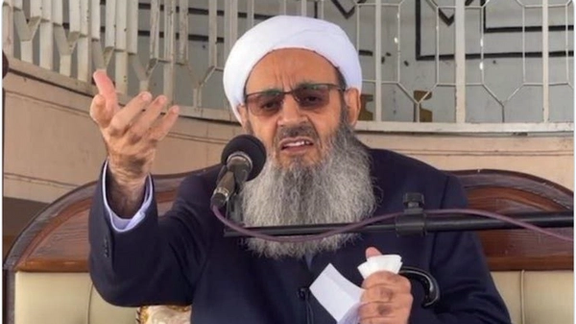Cleric Says People Are Hanged In Iran For Crimes Involving $10

Iran's top Sunni cleric Mowlavi Abdolhamid on Friday slammed the government for spending the country’s money to help other nations and ignoring its own people.

Iran's top Sunni cleric Mowlavi Abdolhamid on Friday slammed the government for spending the country’s money to help other nations and ignoring its own people.
He said the government fails to create jobs which forces many to engage in small criminal activities only to survive, and then hanged when they are caught.
In his sermon the outspoken Mowlavi (title for Sunni cleric) told his congregation in Zahedan, capital of southeastern Sistan-Baluchestan Province, that lack of jobs in his province and some other impoverished areas is the prime reason people are driven to smuggling fuel, minor drug-related offences, or drug trafficking.
In Iran gasoline and especially diesel are extremely cheap (around 10 US cents per gallon) due to heavy government subsidization. This leads to smuggling fuel to neighboring countries such as Pakistan which has long borders with Sistan-Baluchestan.
Many of these individuals, the cleric said, end up in prison or are even executed for committing crimes that involve profiting as little as 5 million rials ($10).

“People have to do all sorts of things just to earn their bread,” he told his congregation who took to the streets after the prayers for the 36th consecutive week to chant anti-government slogans.
Haal Vsh, a website dedicated to human rights and events in Iran’s Baluchestan, reported Friday that security forces cracked down on young Baluchis in various areas of Zahedan after the protests and arrested many.
The Sunni cleric who has proven to be the unofficial voice of the country’s Sunni population has become popular even among Shiites for standing up to the regime and delivering fiery speeches every week since September when the Women, Life, Freedom protests spread across the country.
In his sermon Abdolhamid also brought up the issue of justice for the victims of what has come to be known as the Bloody Friday of Zahedan. On September 30, 2022, security forces opened fire on civilian anti-government protesters killing more than 93 protesters including children and onlookers in Zahedan after Friday prayers.
“Carrying out justice would have brought tranquility and peace [to the locals],” he said. The government has not taken action against those security forces who opened fire on September 30.
“You never remedied our troubles or asked us about what gave us pain,” Abdolhamid said, adding that calm will not be established unless the complaints of workers, teachers, civil servants and pensioners are addressed and remedied.
As Sunni Muslims, Baluch citizens are both an ethnic and religious minority. Estimates of the Iranian Baluch population range from 1.5 to 2 million people. The Baluch community – along with the Kurds -- has always been among the most persecuted minorities and has the largest number of people executed in the country.
Most Baluchis are executed over drug-related charges, but activists say their trials lack due process and poverty-stricken drug mules are often executed without having had proper legal representation.
According to Haal Vsh, the execution of Baluch citizens has increased significantly since last year’s nation-wide protests. It said in a recent report that 182 people were executed in 23 prisons across Iran in the past year of which81% were drug-related.